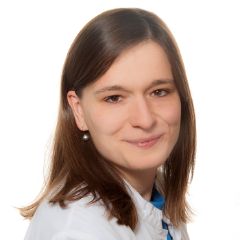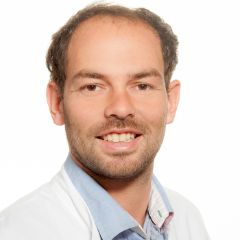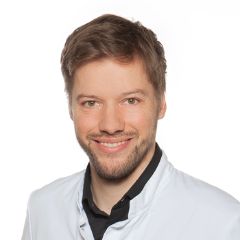Musculoskeletal diagnostics
Our aim is to conduct clinical, practice-oriented research in order to incorporate findings into everyday radiology as quickly as possible and improve patient care. Our projects are primarily geared towards current clinical challenges in musculoskeletal imaging.
One such challenge is magnetic resonance imaging (MRI) in patients with metal implants such as hip or knee joint prostheses. We are constantly optimizing this imaging in close collaboration with our colleagues from radiological physics and medical-technical radiology specialists. We are one of the first locations in the world to offer examinations on the latest generation of low-field MRI. This device has already been used to further improve the diagnosis of inserted metal implants. Our current research is aimed at exploring these possibilities even further and making imaging more efficient.
In addition to MRI, we are also researching new applications of dual-energy computed tomography (DECT) in musculoskeletal imaging. In addition to established procedures such as gout imaging, metal artifacts around prostheses can be reduced or occult fractures can be detected for conventional X-ray or CT using bone marrow edema.
We also use functional imaging techniques to diagnose and assess the progression of musculoskeletal manifestations in systemic tumor diseases. Our whole-body MRI examinations allow us to assess not only the extent of the tumor, but also the response to therapy - without the need for X-rays, intravenous contrast agents or radioactive tracers.
We are constantly working to improve our examination and diagnostic practice. This is why we use innovative algorithms and artificial intelligence to support our daily diagnostic work. Together with the scientists at the Cardiovascular Research Institute Basel (CRIB), we are developing software solutions that allow automated highlighting of bone pathologies.
Fellowship/training in musculoskeletal radiology
As a specialist, you can deepen your clinical interests in musculoskeletal radiology in a structured one- or two-year fellowship. In 2015, we established a cooperation with the German Society for Musculoskeletal Radiology (DGMSR) and act as an instructor. You can acquire the DGMSR Diploma in Musculoskeletal Radiology from us and also train to become an expert in musculoskeletal radiology (DGMSR).
Our common goal is to improve quality and strengthen musculoskeletal radiology.
Employees in musculoskeletal diagnostics
Department management

Dr. Dorothee Harder
Leitung muskuloskelettale Diagnostik
Radiologie und Nuklearmedizin
Tel. +41 61 328 63 44
Senior physicians

PD Dr. Ricardo Donners - EDiMSK
Kaderarzt muskuloskelettale Diagnostik und Fellow interventionelle Radiologie
Radiologie und Nuklearmedizin
Tel. +41 61 328 69 11

Dr. Sebastian Eiden
Oberarzt muskuloskelettale Radiologie sowie Fellow und Oberarzt diagnostische und interventionelle Neuroradiologie
Radiologie und Nuklearmedizin
Tel. +41 61 556 57 21

Verena Funk
Oberärztin muskuloskelettale sowie abdominelle und onkologische Diagnostik, Leitung Sonografie
Radiologie und Nuklearmedizin
Tel. +41 61 328 73 71

PD Dr. Markus Obmann
Kaderarzt muskuloskelettale sowie abdominelle und onkologische Diagnostik, Leitung Computertomografie und Röntgendiagnostik, stv. Leitung muskuloskelettale Diagnostik
Radiologie und Nuklearmedizin
Tel. +41 61 556 59 05

Dr. Thomas Weikert - MD, PhD
Stv. Oberarzt und Fellow muskuloskelettale Diagnostik
Radiologie und Nuklearmedizin
Tel. +41 61 328 65 76
Fellows

Dr. Thomas Weikert - MD, PhD
Stv. Oberarzt und Fellow muskuloskelettale Diagnostik
Radiologie und Nuklearmedizin
Tel. +41 61 328 65 76
Assistance
